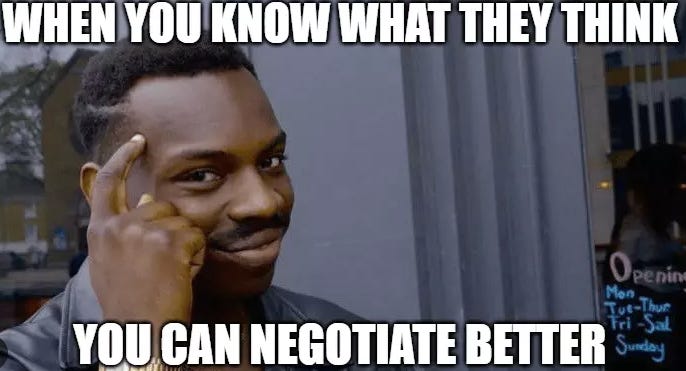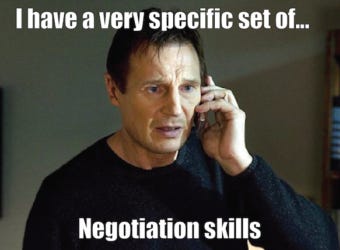Why negotiating is damn hard and what we can do to improve at it
Negotiation is a critical part of doing business as a consulting firm, whether you're dealing with clients, suppliers, partners or employees. However, despite its importance, many individuals struggle when it comes to mastering this useful skill in the middle between art and science.
Today, we will explore some of the reasons behind why we often fall short in negotiations and some ideas on how to overcome these common challenges.
I find that one of the primary obstacles in negotiation is the emotional investment we have in the work that we do. When we've poured our creativity and efforts into a project, it becomes more than just a product or service we offer.
It becomes a part of us.
This emotional investment can make negotiations incredibly challenging.
When a client hesitates, or attempts to negotiate a lower price, it can feel like rejection.
It's no more business, it feels personal to us.
We suddenly turn into lawyers building a defense strategy for our own work, sometimes even at the expense of a successful negotiation.
To address this challenge, it's crucial to recognize that, while our work is a part of us, what we are dealing with is, in fact, a business transaction. Separating our emotional component from the negotiation process allows us to make objective decisions and find common ground with our clients.
Successful negotiations require skilled negotiators who can remain objective and focused on the deal's terms.
One-person firms, or what Justin Welsh defines solopreneurs, often find themselves in the position of negotiating their own deals. As we mentioned, this vulnerability can lead to feelings of personal rejection when a client pushes back.
Hello 👋 one quick ask before you keep reading.
If you are new to this newsletter, please subscribe: it’s free… and interesting ✔
If you are already subscribed, please share it: don’t be selfish! 🤗
As a firm grows, it's essential to identify individuals within the business who can handle negotiations effectively. These negotiators should be able to separate their personal feelings from the process, allowing for more strategic and successful outcomes.
(If you are interested, Chris Voss covers many negotiation techniques in his book “Never split the difference”. Chris can come across as a bit “intense” in his way to present concepts, but he definitely knows what he’s talking about).
It is crucial that we approach a negotiation with confidence.
Typically, confidence is closely tied to having leverage, and leverage can come from two sources:
you have superior choices;
you have superior knowledge.
The first source, choices, is influenced by how well-positioned you are in the market and the effectiveness of your go-to-market strategy.
If your offering is not easily replaceable by your competitors, you have leverage: “Nobody can offer what I can offer. If you don’t buy it from me, you’re stuck”.
The second part of leverage is your confidence in your knowledge. Even when options are limited, your self-belief can be a powerful tool.
Believing in your expertise and the value you bring to the table is a form of leverage: “We're good at what we do. There will always be another deal to be made”.
Such confidence will enable you to push back and negotiate from a position of strength, even when - over the short-term - options seem limited.
Clients and consultants: a level playing field
Yes, I said it: it’s not the other person that starts from a position of strength. That perspective is flawed and can lead to a power imbalance that favors the client.
Instead, both parties should enter the negotiation with the belief that they are valuable.
Why?
Because when both sides see themselves as valuable, the negotiation dynamics shift.
There’s no one party holding all the power (for example, because they have the money); both parties recognize the unique expertise and contributions they bring to the table.
Ultimately, negotiation is a skill that requires training and practice. Even firms that are well-positioned in their markets can falter in negotiations if their team is not adequately trained.
Sometimes, I am the client and when I have people that are not negotiation experts in front of me… well, I take advantage of the situation. In fact, not even my wife wants to sit next to me when I am running a negotiation as a client: she is often embarrassed because - she says - I am pushing too hard.
In a corporate setting though, especially when dealing with procurement professionals, we should know that they are well-trained in negotiation tactics. To level the playing field, we should invest in negotiation training ourselves. This can equip us and our team with the knowledge and the strategies necessary to navigate complex negotiations effectively.
I have been dealing for more than a decade with procurement professionals. They are damn good at their job and they show no hesitation in walking all over you if that's beneficial to them. Yes, we can say they are snakes with their sneaky techniques and their murky behavior, but they are simply doing their job. We need to upskill ourselves to match them.
Finally, it's essential to strike a balance between focusing on transactions and building relationships. Some firms prioritize the financial aspects of the deal to the detriment of fostering long-term relationships with their clients. Firms should view their engagements as multi-year relationships aimed at creating value for both parties.
Rather than purely transactional interactions, these relationships emphasize collaboration and mutual benefit.
By shifting the perspective from transactional to relational, firms can build trust with their clients, which can lead to more successful negotiations in the long run.
Clients who see the value in the relationship are often more willing to negotiate fair terms and provide ongoing support.
Closing thoughts
Mastering the art and science of negotiation requires recognizing and addressing common challenges. Negotiation is a skill that can be honed and improved with practice and some work on our mindset.
By overcoming these challenges, individuals and firms can approach negotiations with confidence and achieve more favorable outcomes.
Ultimately, negotiation is not just about getting the best deal: it's about building lasting and mutually beneficial relationships that matter to our business.
That’s it for this week
But before you move on, I would be grateful if you could provide some feedback on the content of this newsletter.
Feel free to email me directly or just answer this poll!




